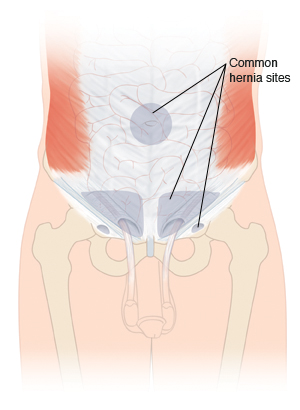Hernia (Adult)

A hernia can happen when there is a weakness or defect in the wall of the abdomen or groin. Intestines or nearby tissues may move from their usual location and push through the weakness in the wall. This can cause a bulge (hernia) you may see or feel.
Causes and risk factors
A hernia may be present at birth. Or it may be caused by the wear and tear of daily living. Certain things can make a hernia more likely. These can include:
-
Heavy lifting
-
Straining, whether from lifting, movement, or constipation
-
Chronic cough
-
Injury to the abdominal wall
-
Excess body weight
-
Pregnancy
-
Past surgery
-
Older age
-
Family history of hernia
Symptoms
Symptoms of a hernia may come on suddenly. Or they may appear slowly over time. Some common symptoms include:
-
Bulge in the groin area, around the navel, or in the scrotum. The bulge may get bigger when you stand and go away when you lie down.
-
Pain or pressure around the bulge
-
Pain or increased bulging during activities, such as lifting, coughing, or sneezing
-
A feeling of weakness or pressure in the groin or abdomen
-
Pain or swelling in the scrotum
Types of hernias
There are different types of hernia. The type you have depends on where it is:
-
Inguinal. This type is in the groin or scrotum. It's more common in men. But women can also get this hernia.
-
Femoral. This type is in the groin, upper thigh, or labia. It's more common in women.
-
Ventral. This type is in the abdominal wall.
-
Umbilical. This type occurs around the bellybutton (navel).
-
Incisional. This type occurs at the site of a past surgery.
The condition of the hernia can help determine how quickly it needs to be treated.
-
Reducible. It goes back in by itself, or it can be pushed back in.
-
Irreducible. It can’t be pushed back in.
-
Incarcerated or strangulated. The intestine is trapped (incarcerated). If this happens, you won’t be able to push the bulge back in. If the incarcerated hernia isn’t treated, it may become strangulated. This means the area loses blood supply and the tissue may die. This needs emergency surgery. You need treatment right away.
If your symptoms are not severe, treatment may sometimes be delayed. In such cases, you will need regular follow-up visits with the healthcare provider (watchful waiting). You’ll be asked to keep track of your symptoms and to watch for signs of more serious problems. You may also be given guidelines similar to the home care instructions below.
Home care
To help keep a hernia from getting worse, you may be advised to:
-
Not do any heavy lifting or straining as directed.
-
Take steps to prevent constipation. This includes eating more fiber and drinking more water. This may help reduce straining that can occur when having a bowel movement. Reducing straining may help keep your symptoms from getting worse.
-
Stay at a healthy weight or lose extra weight. This can help reduce strain on abdominal muscles and tissues.
-
Stop smoking. This can help prevent coughing that may also strain abdominal muscles and tissues.
Follow-up care
Follow up with your healthcare provider, or as directed. If you had imaging tests, they will be reviewed by a healthcare provider. You will be told the results and any new findings that may affect your care.
When to get medical advice
Call your healthcare provider right away if any of these occur:
-
Hernia hardens, swells, or grows larger
-
Hernia can no longer be pushed back in
-
Pain moves to the lower right abdomen , or spreads to the back
-
You have new symptoms
Call 911
Call 911 if any of these occur:
-
Severe pain, redness, or tenderness in the area near the hernia
-
Pain gets worse quickly and doesn’t get better
-
Inability to have a bowel movement or pass gas
-
Fever of 100.4°F (38°C) or higher, or as directed by your healthcare provider
Online Medical Reviewer:
Heather M Trevino BSN RNC
Online Medical Reviewer:
Robyn Zercher FNP
Online Medical Reviewer:
Shaziya Allarakha MD
Date Last Reviewed:
9/1/2024
© 2000-2025 The StayWell Company, LLC. All rights reserved. This information is not intended as a substitute for professional medical care. Always follow your healthcare professional's instructions.